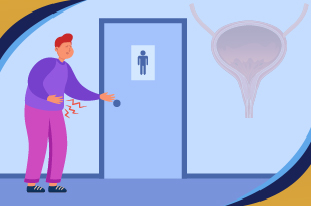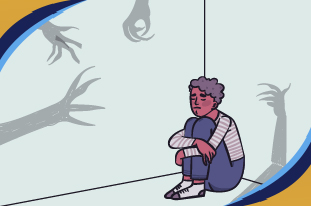We know that living with someone who has bipolar disorder can be hard but it’s not their fault as the mental condition is hereditary. But you can help them, so both of you and your family members can lead a sustained life together. So, how do you help someone with bipolar disorder? While it can be tough to strike a balance, it can be done if you follow some standard operating procedures, which we will discuss below. Let’s begin:
What is Bipolar Disorder?
Before we begin on how to help someone with bipolar disorder, we need to properly define what exactly bipolar disorder is. Knowing comprehensively about this mental condition can help you greatly in dealing with a bipolar person. Bipolar disorder, previously called manic depression, is a type of mental condition that is characterized by the extreme mood swings of individuals affected by it. The mood swings are defined by two extremes on the spectrum: Manic and Depressive. In the manic episode, the affected individual suffers from something that is almost close to mania and the depressive episode bears the general hallmarks of clinical depression.
Bipolar disorder has 4 different types. Knowing about these types can shed light on the symptoms of someone who is bipolar. These different types are listed below:
Bipolar 1
Someone you know who has suffered from at least one episode of mania that has lasted for a week or two and may have suffered from at least two episodes of depression probably has Bipolar 1.
Bipolar 2
If someone has suffered from at least one episode of depression and maybe one episode of hypomania (extreme mania) then they are probably suffering from Bipolar 2.
Cyclothymia Disorder
If your loved one or someone you know has suffered from both types of episodes consistently for over 2 years and the underlying symptoms don’t fall under bipolar 1 or 2, then they are probably suffering from this one.
Rapid Cycling
More common in women than in men, rapid cycling is characterized by at least 4 instances of episodes that were either manic, depressive, or a combination of both that have happened consistently for a year or so. While not officially considered a type of bipolar disorder, it nonetheless bears the features of a bipolar disorder. Episodes in it can have instances of calm and usually hypomania or mania is followed by a depressive episode.
Causes of Bipolar Disorder
So, what causes someone to have bipolar disorder? There is no single cause of bipolar disorder. If you really want to pinpoint something then the cause is a mix of genetics, environment, and certain psychological triggers like:

- Consistent Emotional, Sexual or Physical Abuse
- Bereavement – Death of a Loved One
- Loss of a Loved One (i.e. through a breakup)
- Physical Illness
- Unhealthy Sleep Patterns
- Overwhelming and Burdening Problems
Challenges Faced When Dealing With A Bipolar Person
You even face challenges when you are trying to learn how to help someone with bipolar disorder, rest assured you will face challenges when you are indeed dealing with a bipolar person.
The severe symptoms of someone who has bipolar can be hard on their partner, friends, or family members. This is because the sufferers and the people they are supported by have to experience severe changes in mood, energy, activity levels, and even sleep patterns. These changes can affect the day-to-day lives of people who are trying to help someone with bipolar disorder, which in this case could be someone you know!
Sometimes, the symptoms of someone who is bipolar can also turn psychotic. People with bipolar disorder who have psychotic breaks exhibit symptoms such as hallucinations, delusions or a combination of both. This is not only scary for the affected individual but for those around them too
So, How to Help Someone With Bipolar Disorder?
Although living with someone who has this mental condition isn’t easy positivity can be added to someone’s life whom we are trying to help by just following these simple steps below:
Educating Yourself
Becoming knowledgeable about the disorder is not only for you but for the sufferer too. An example can be how you can help in dealing properly with a manic or depressive episode because you know how one should react appropriately to these episodes just because you read about them.
Take An Active Part In Their Treatment
One way to positively impact someone suffering from bipolar disorder is to actively take part or actively help them in their treatment. Although their treatments usually consist of therapies and medication, as support you should accompany them for these, so they know they are not alone.
Follow A Plan
Making a plan can ensure that you are ready for whatever episode someone who is suffering from bipolar disorder is going through. For example, you can make arrangements for suicide prevention as suicidal thoughts are common in the depressive episode.
Listen to Them
Instead of just asking how to help someone with bipolar disorder again and again just do the one thing you should always ensure: Make them feel heard. This is an extremely important aspect of help that should be provided to someone diagnosed with bipolar disorder.
Avoid Neglecting Yourself
People who try to support think the best way to help someone with bipolar disorder is to be continuously available. This is not a suitable way to do things when it comes to helping people with bipolar disorder. When a plane is going down, would you want to put on the oxygen mask on you first or the person next to you who needs help? Common sense says that you would do it for yourself. It is the same when dealing with a bipolar disorder person.
While Support Is Necessary, Don’t Force It
It is important to let the professional help intervene when it is needed and take a step back from supporting but at the same time ensure that when you indeed have to intervene as whatever causes someone to have bipolar disorder, it also causes them to have uncontrollable mood swings. For that they need someone there to support them.
Know Their Limits
When you are trying to know everything about how to help someone with bipolar disorder, also try to know when it’s time to go for professional health services. Even when your loved one says that they are okay with their symptoms and can manage on their own, you still have to motivate them to visit a therapist or psychiatrist, who will put the person suffering from bipolar on watch. This has to be done, so professional experts can help find concrete resolutions for the symptoms of someone who is bipolar.
Why Should Also Know About The Treatment?
Treatment is important to answer your question of how to help someone with bipolar disorder. Knowing about treatment also helps you in taking an active part in formulating a treatment plan for bipolar sufferers. There are different ways treatment can be done if you see signs someone is bipolar:
Psychotherapies:
While there is no one best way to help someone with bipolar disorder as there are a handful of them, these “Talk Therapies” are also extremely beneficial for treating the symptoms of someone who is bipolar. There are many examples of these therapies, with each focusing on a specific domain. Some of these are:
Cognitive Behavioral Therapy (CBT):
CBT is a type of “Talking Therapy” that is also used for treating people with bipolar disorder. In this case, a mental health expert helps the patient come to terms with the negative thought processes that govern their behavior and tries to find solutions for how these negative thought processes can be turned into positive ones.
Interpersonal & Social Rhythm Therapy:
Bipolar polar sufferers under this type of treatment try to keep a record of their daily activities including sleep patterns, which can then be analyzed by mental health experts, through which they can regulate those daily activities to keep a lid on the extreme moods. Complications and conflicts stemming from relationships i.e. politics at work or a recent break-up are also observed to find their solutions.
Family-Focused Therapy
This type of psychotherapy can be used to treat bipolar disorder by having all family members in attendance at the therapy session. This way families can know more about the condition and collectively learn about resolutions that help dealing with a bipolar person.
Medication:
While antidepressants like Selective Serotonin Reuptake Inhibitors (SSRIs) can be helpful in dealing with the depressive episodes of the condition but do not exactly provide an accurate answer to the question “How to Help Someone With Bipolar Disorder?”
Common mood stabilizers like Lithium, Lamotrigine, or Valproic Acid can be used to effectively treat the different and extreme moods that define bipolar disorder. These can also be used with SSRIs to treat the condition with a two-pronged approach but keep in mind that all dosage and the type that is to be taken is prescribed by an expert psychiatrist.
Lifestyle Changes:
Changes in the everyday life of a bipolar sufferer can help regulate the effects of treatment as a way to complement them. Some of these changes can be:
- High Intensity Workout
- Getting A New Hobby
- Improve Sleep Patterns
- Keep A Healthy Diet
- Avoid Substance Abuse
- Keep A Journal
- Identify Triggers And Avoid Them
Conclusion:
We have laid a whole best practices guidelines to help know how to help someone with bipolar disorder. While there are different types of bipolar disorders, there are also different treatment kinds that help resolve the symptoms of someone who is bipolar. Orange Coast Psychiatry has a host of mental health experts who can help you find resolutions for people you may know who are suffering from mood disorders such as bipolar disorder.
























